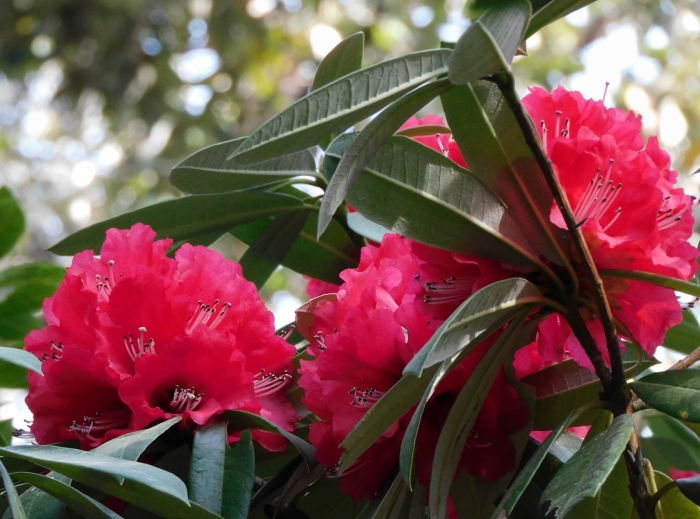Tree Rhododendron
(Rhododendron arboreum)
Tree Rhododendron (Rhododendron arboreum)
/
/

Jagdish Singh Negi
CC BY 4.0
Image By:
Jagdish Singh Negi
Recorded By:
Copyright:
CC BY 4.0
Copyright Notice:
Photo by: Jagdish Singh Negi | License Type: CC BY 4.0 | License URL: http://creativecommons.org/licenses/by/4.0/ | Rights Holder: Jagdish Singh Negi | Publisher: iNaturalist | Date Created: 2022-03-25T07:50:53-07:00 |

























Estimated Native Range
Summary
Rhododendron arboreum, commonly known as Tree Rhododendron, Gurans, or Burans, is an evergreen shrub native to the Himalayas and associated mountain ranges in Southern Asia, including India, Nepal, Bhutan, and parts of China. It thrives in montane forests, often at altitudes of 1,200 to 3,600 meters, where it is a dominant species in rhododendron and mixed coniferous forests. The Tree Rhododendron can grow slowly to a height of 12-36 feet (3.7-11 meters) and a width of 10-15 feet (3-4.6 meters), with a dense, rounded habit. Its leaves are large, leathery, and dark green, providing a lush backdrop for the spectacular blooms. The flowers are typically bright red, but can also be pink or white, and are very showy, blooming in clusters from late winter to early spring.
The Tree Rhododendron is valued for its striking flowers and as a source of nectar for pollinators. It is used in gardens and parks for ornamental purposes, and in larger landscapes, it can serve as a privacy screen or windbreak. This species prefers acidic, well-drained soils, and while it tolerates part shade, it will flower more abundantly in areas with dappled sunlight. It requires consistent moisture, but cannot tolerate waterlogged conditions. Rhododendron arboreum is susceptible to various pests and diseases, including root rot, lace bugs, and rhododendron borers. It is also potentially invasive outside its native range, so gardeners should consult local regulations before planting.CC BY-SA 4.0
The Tree Rhododendron is valued for its striking flowers and as a source of nectar for pollinators. It is used in gardens and parks for ornamental purposes, and in larger landscapes, it can serve as a privacy screen or windbreak. This species prefers acidic, well-drained soils, and while it tolerates part shade, it will flower more abundantly in areas with dappled sunlight. It requires consistent moisture, but cannot tolerate waterlogged conditions. Rhododendron arboreum is susceptible to various pests and diseases, including root rot, lace bugs, and rhododendron borers. It is also potentially invasive outside its native range, so gardeners should consult local regulations before planting.CC BY-SA 4.0
Plant Description
- Plant Type: Shrub, Tree
- Height: 12-36 feet
- Width: 10-15 feet
- Growth Rate: Slow
- Flower Color: Red, Pink, White
- Flowering Season: Winter, Spring
- Leaf Retention: Evergreen
Growth Requirements
- Sun: Part Shade
- Water: Medium
- Drainage: Medium, Fast
Common Uses
Bee Garden, Bird Garden, Hedges, Low Maintenance, Potted Plant, Showy Flowers
Natural Habitat
Montane forests and mixed coniferous forests in the Himalayas and associated mountain ranges
Other Names
Common Names: Gurans, Burans
Scientific Names: , Rhododendron arboreum, Rhododendron arboreum var. arboreum, Rhododendron zeylanicum,
GBIF Accepted Name: